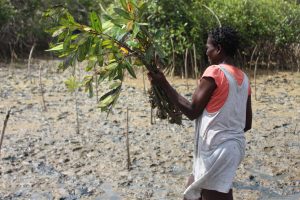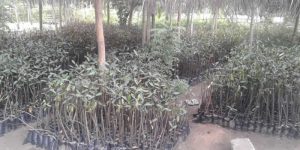 The roles of mangroves to the management and sustainability of fisheries resources cannot be over emphasized for which reason government would have to take steps towards ensuring conservation of mangroves.
The roles of mangroves to the management and sustainability of fisheries resources cannot be over emphasized for which reason government would have to take steps towards ensuring conservation of mangroves.
However, the efforts of some non-governmental organizations to preserve these mangroves so they could continue playing those important roles seems to be yielding positive results. Sustainable Fisheries Management Project (SFMP), through Hen Mpoano, one of such non-governmental organizations as part of its conservation and restoration efforts of mangroves and fisheries resources has through the active involvement of the community people embarked on mangrove replanting activity in the Ankobra wetland ecosystem.
SFMP with support from USAID has so far replanted 18 hectors of degraded mangrove areas with 28,000 seedlings of red mangroves in the Ankobra Estuary, and is looking forward to planting additional 20,000 come April this year.
It is estimated that about 115 hectors out of 118 hectors of mangroves in the Ankobra Estuary have been degraded thus a lot of efforts would have to go into recapturing the lost mangroves. The major fear however is that the gains made so far would be eroded if nothing concrete and binding is put in place to limit and control the harvesting of the mangroves. It is for this reason that the people led by the Programme Coordinator of Hen Mpoano, a local partner of SFMP, Stephen Kankam are advocating for the institution of bye-laws by the Metropolitan, Municipal and District Assemblies with wetlands where mangroves thrives to help go the extra mile to making the preservation efforts worthwhile.
Mr. Stephen Kankam noted that all communities in the Ankobra Estuary including Sanwoma, Eziome, Ajomoro Eshiem, Kukuavile and Adelekezo are all heavily dependent on the mangrove for fish smoking, fire wood and building leading to over exploitation of the mangrove; and is appealing for well-meaning voices to be head championing the institution of bye-laws to reduce the exploitation. Currently, he noted though Assemblies have the mandate to enact such bye-laws for the regulations of the harvesting of mangroves no such thing has been instituted thus making the making preservation efforts a little dicey.
IMPORTANCE OF MANGROVES
In the management of fishing stocks, mangroves play important roles serving as breeding grounds for most marine fishes. They migrate to the estuaries and lay their eggs in the mangroves, hatch and the young ones stay there until they are old enough before returning to the marine environment.
It also plays host to some migrating birds during certain periods of the year. It also plays significant roles in flood management in the communities.
MANAGEMENT PRACTICES
To carry the people along for positive impact, SFMP through the adoption of co-management practices ensured the full involvement of the community.
 Through Hen Mpoano, a local partner of SFMP, a mangrove nursery was established at Ankobra. While Hen Mpoano provide technical support to map the degraded mangroves sites, the community members were engaged in the replanting exercise. This provide them alternative income especially when they experience low catch from their fishing activities.
Through Hen Mpoano, a local partner of SFMP, a mangrove nursery was established at Ankobra. While Hen Mpoano provide technical support to map the degraded mangroves sites, the community members were engaged in the replanting exercise. This provide them alternative income especially when they experience low catch from their fishing activities.
The active involvement of the community has given them the urge to take more control of their environment particularly their natural resources for which reason they established the Ankobra Mangrove Restoration Committee to guide and oversee how the mangrove is used and maintained.
It is also worth stating that asking people to reduce their dependence on the mangroves for their livelihood would come with challenges without any diversified livelihood. Hence SFMP once again partnered Hen Mpoano to create a resilience plan in a form of Village Savings and Loan Scheme. The scheme ensures members are financially empowered to address some specific challenges confronting them thus reducing dependence on fisheries and mangroves any time they need money.
COMMUNITY IMPACT
The fisher folks speaking to ghanadisricts.com have attested to witnessing some improvement in their fishing which they attributed to the conservation practices.
According to them, last year for the example not only have they recorded increase in shrimps harvest but also the sizes of the shrimps were bigger, and they hope to strictly adhere to the close season and other conservation practices to restore the fishing stock in the river.
Additionally, while they assist in the replanting of the mangroves, they end up raking in some income from SFMP that engages them, and that comes as a major relief and additional income to them.
read more at http://ghanadistricts.com/Home/Reader/13f190b-6107-4268-a6


